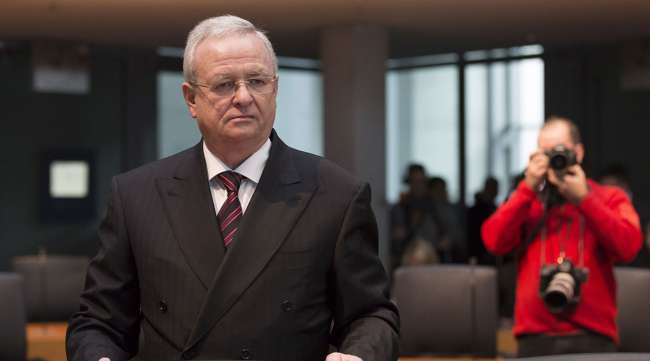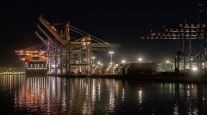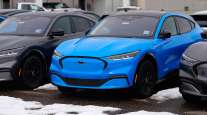Bloomberg News
Ex-VW Chief Sticks to Story on 2015 Diesel Testing Scandal

[Stay on top of transportation news: Get TTNews in your inbox.]
For seven years, the German public hasn’t seen much of former Volkswagen AG CEO Martin Winterkorn, aside from his occasional appearance at a home game for the Bayern München soccer team.
On Feb. 14, the ex-VW head broke his silence in a court in the town of Braunschweig, speaking in public for the first time since 2017 about his role in one of the biggest corporate scandals in German history.
But just like seven years ago, he rejected any blame for a scam in which the company used a so-called defeat device to undermine carbon emission testing.
While his persona has “always been closely associated with the events surrounding the diesel scandal” this was “only true to a limited extent,” Winterkorn told the court. “I wasn’t involved in the development and use of the switch function,” he insisted, referring to the name VW gave the device.
Winterkorn said he didn’t know the device was implemented and later, when the U.S. authorities were probing the issue, he didn’t know they would react in such a harsh manner that required an immediate informing of the markets. He assumed VW would promptly produce a legally and technically flawless solution to dispel the concerns. That’s what his engineers told him, he said.
“Had everything been explained to me correctly, I wouldn’t have hesitated to take the right steps,” he said. “I would have traveled to the U.S. myself to negotiate with the authorities.”
Winterkorn is testifying as part of a 9 billion euro ($9.7 billion) investor suit over the diesel affair, which sparked global outrage and triggered his hasty departure from the company in September 2015. VW has now paid more than 30 billion euros in penalties and related costs because of the scandal.
How does hydrogen fuel cell technology fit into freight transportation? Find out with Parker Meeks, the CEO of Hyzon, a company that designs and manufactures fuel cell technology for heavy-duty transport applications. Tune in above or by going to RoadSigns.ttnews.com.
In his last public appearance at a parliamentary inquiry into the scam, he already denied any responsibility.
The former CEO is the latest of the 86 witnesses testifying in the class action-style lawsuit. Ex-VW leaders Herbert Diess and Matthias Müller have already taken the stand. The suit was brought by investors claiming that VW took too long to inform them about misconduct in the diesel scandal, causing losses in the value of their securities.
While Diess and Müller were called on by VW to defend the company, both the carmaker and investors nominated Winterkorn as a witness for their respective cases. VW is trying to prove that company leadership had no early knowledge about the defeat device, and investors are trying to prove the opposite.
The 76-year-old’s willingness to testify at all has come as a surprise as he still faces two indictments over the diesel scandal and could have therefore claimed a suspect’s privilege to remain silent. Given these probes, Winterkorn told the judges Feb. 14 that he won’t say anything about events from July 27, 2015, until Sept. 23, 2015, the crucial time frame when Volkswagen was under pressure but the scam wasn’t yet disclosed.
Along with four others, Winterkorn was charged in 2019 with fraud for allegedly having VW vehicles equipped with the deceptive software. While Winterkorn’s charges were separated from the group due to a health issue that made him unfit to stand trial, that case has been ongoing since 2021, and no end is in sight.
Want more news? Listen to today's daily briefing above or go here for more info
The other indictment alleged that Winterkorn, Diess and VW chairman Hans Dieter Pötsch informed markets too late about the diesel-emission rigging, mirroring the investor allegation of market manipulation in the current civil suit. Diess and Pötsch agreed to settle the charges in 2020, and the criminal case against Winterkorn was dropped the following year on the grounds that prosecutors wanted to prioritize the fraud trial, which would potentially result in a much higher sentence.
That strategy must have changed recently, as the court, acting at the request of prosecutors, decided to revive the market-manipulation indictment a day after the Christmas holidays. A medical expert who examined Winterkorn concluded that the former CEO will be fit to stand trial by September. That’s the soonest his criminal trial could begin, and the court could hear both charges at once.





